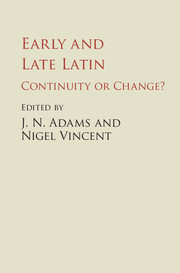Description
Early and Late Latin
Continuity or Change?
Coordinators: Adams J. N., Vincent Nigel
This book focuses on the continuity between the documented stages in the history of Latin and its development into Romance.
Language: English
Subject for Early and Late Latin:
Publication date: 10-2016
490 p. · 15.8x23.5 cm · Hardback
490 p. · 15.8x23.5 cm · Hardback
Description
/li>Contents
/li>Biography
/li>
This book addresses the question of whether there are continuities in Latin spanning the period from the early Republic through to the Romance languages. It is often maintained that various usages admitted by early comedy were rejected later by the literary language but continued in speech, to resurface centuries later in the written record (and in Romance). Are certain similarities between early and late Latin all that they seem, or might they be superficial, reflecting different phenomena at different periods? Most of the chapters, on numerous syntactic and other topics and using different methodologies, have a long chronological range. All attempt to identify patterns of change that might undermine any theory of submerged continuity. The patterns found are summarised in a concluding chapter. The volume addresses classicists with an interest in any of the different periods of Latin, and Romance linguists.
1. Continuity and change in the history of Latin Nigel Vincent; 2. Comic lexicon: searching for 'submerged' Latin from Plautus to Erasmus Giuseppe Pezzini; 3. Third person possessives from early Latin to late Latin and Romance Tommaso Mari; 4. The language of a Pompeian tavern: submerged Latin? James Clackson; 5. Ad versus the dative: from early to late Latin James Adams and Wolfgang De Melo; 6. Variation and change in Latin BE-periphrases: empirical and methodological considerations Lieven Danckaert; 7. Analytic passives and deponents in classical and later Latin Philip Burton; 8. On the use of habeo and the perfect participle in earlier and later Latin Gerd Haverling; 9. Expressions of time in early and late Latin: the case of temporal habet Stelios Panayotakis; 10. Quid ago? Quid facimus? 'Deliberative' indicative questions from early to late Latin Anna Chahoud; 11. On coepi/incipio + infinitive: some new remarks Giovanbattista Galdi; 12. Infinitives with verbs of motion from Latin to Romance James Adams and Nigel Vincent; 13. Causatives in Latin and Romance Nigel Vincent; 14. The development of the comparative in Latin texts Brigitte Bauer; 15. Analytic and synthetic forms of the comparative and superlative from early to late Latin Robert Maltby; 16. Left-detached constructions from early to late Latin (nominatiuus pendens and attractio inuersa) Hilla Halla-aho; 17. Six notes on Latin correlatives Philomen Probert and Eleanor Dickey; 18. Epilogue: some patterns of change James Adams.
J. N. Adams, CBE FBA, is an Emeritus Fellow of All Souls College, Oxford, an Honorary Fellow of Brasenose College, Oxford and an Honorary Research Fellow at the University of Manchester. He was awarded the Kenyon Medal for Classical Studies of the British Academy in 2009.
Nigel Vincent, FBA MAE, is Professor Emeritus of General and Romance Linguistics at the University of Manchester. He has held visiting appointments at the Universities of Pavia and Rome III, and at the Romansk Institut in Copenhagen, and has held an Erskine Fellowship at the University of Canterbury, New Zealand.
Nigel Vincent, FBA MAE, is Professor Emeritus of General and Romance Linguistics at the University of Manchester. He has held visiting appointments at the Universities of Pavia and Rome III, and at the Romansk Institut in Copenhagen, and has held an Erskine Fellowship at the University of Canterbury, New Zealand.
© 2024 LAVOISIER S.A.S.




